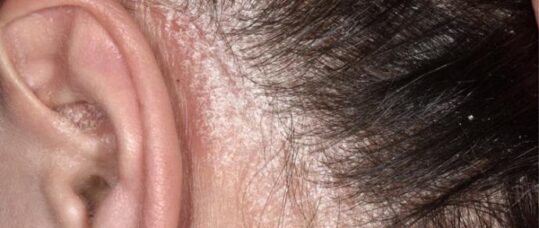Topical treatments for scalp psoriasis

Scalp psoriasis affects 75-90% of people who typically present with chronic plaque psoriasis.1
The whole scalp can be affected, or individual plaques may be visible that are itchy and embarrassing.2 Plaques may be very thick, particularly in the occipital region. In some people scalp psoriasis may be associated with areas of non-scarring alopecia (hair loss) if there is thick, adherent scale extending up the hair shaft (pityriasis amiantacea), from repeated scratching of the scalp due to itching (usually reversible) and in people with erythrodermic psoriasis the alopecia can be severe.1
Related Article: Prescribing in England to be led by a single national formulary
Topical treatments are first line for treating scalp psoriasis but applying them to the scalp is difficult because of the hair. There are a number of topical drugs in use, such as topical corticosteroids, vitamin D, tar-based preparations, tacrolimus, dithranol or salicylic acid.1,2
Medicated shampoos containing coal tar derivatives (Polytar or Alphosyl) and ingredients to remove skin scales (salicylic acid and coconut oil) can be helpful to manage mild psoriasis and scale. Shampoos should be massaged into the scalp for five minutes to allow the shampoo to penetrate the scale and then washed out.3 Salicylic acid and coconut oil can be applied for several hours or overnight to treat thick scaly areas before washing out with a medicated shampoo (Sebco or Cocois). It is important to remove thick scales to allow other scalp therapies to work effectively.4,5 These treatments are messy and if left on overnight patients should use an old pillowcase or towel and shower cap. These products may need to be used for a few days until the scale diminishes, and then used prn as the scale builds up.3
Topical corticosteroids are frequently used to manage scalp psoriasis. Potent and very potent topical corticosteroids can be used short term or intermittently and are available as lotions, gels, foam and a prescription shampoo (Etrivex shampoo – this needs to be massaged on to the scalp and left on for 20 minutes before washing out), which are easier to apply in the scalp than ointments and creams. It is best to avoid alcohol based solutions, which are not as well tolerated. A topical corticosteroid scalp preparation should be applied to affected areas of the scalp when dry, and left on. If applied to wet hair it will dilute the effect, so avoid washing the hair for at least two hours after the application or ideally wash the hair at the other end of the day.3,4
For psoriasis affecting the hair margins a mild (hydrocortisone 1%) to moderate (clobetasone butyrate) topical corticosteroid should be used.3 Care is also needed when using potent or very potent topical corticosteroids around the face – any products that drip or run on to the face should be washed off.4 Vitamin D (calcipotriol or tacalcitol) lotions, ointments and gels can also be used on the scalp and some are available as a combination with topical corticosteroids (Dovobet gel and Enstilar).5 They have the benefit of combining a topical steroid (betamethasone) with a vitamin D analogue and are proven to be superior when compared to using either agent alone.3 The applicator will allow a precise amount of gel to be massaged on to affected areas on scalp while dry. It can sometimes leave the scalp feeling greasy, so it is recommended that the gel is applied in an evening and is washed out the following morning with shampoo that should be massaged in to the treated areas of the scalp before washing off with water.3,4
Related Article: Advice on Guillain-Barré risk for adult RSV vaccine updated by MHRA
What is important is to offer further information about psoriasis, including practical tips about hair care (see resources). Treatment with topical preparations following current guidance should be provided and reviewed regularly to monitor the response and adherence to the treatments and consider referral if there is a poor response to treatment or if lesions are extensive, severe, or not responding to treatment.1
Sandra Lawton is nurse consultant in dermatology for Rotherham NHS Foundation Trust
References
Related Article: Quick quiz: Management of COPD
- NICE. CKS:Psoriasis. London;NICE:2017
- Schlager J, Rosumeck S, Werner R, et al. Topical treatments for psoriasis of the scalp. Cochrane Database Syst Rev 2016;2:CD009687
- Primary Care Dermatology Society. Psoriasis: scalp psoriasis. London;PCDS:2018
- Hilton R. Management of psoriasis affecting high-impact sites. Dermatol Nurs 2016;15:23-7
- British Association of Dermatologists. Topical Treatments for Psoriasis. London;BAD:2017
Resources
- DermNetNZ: Psoriasis dermnetnz.org/topics/psoriasis
- The electronic Medicines Compendium (eMC) medicines.org.uk/emc
- Primary Care Dermatology Society. Psoriasis: an overview and chronic plaque psoriasis pcds.org.uk/clinical-guidance/psoriasis-an-overview#aetiology
- Psoriasis Association. Scalp Psoriasis psoriasis-association.org.uk/psoriasis-and-treatments/types-of-psoriasis#
- The Psoriasis and Psoriatic Arthritis Alliance (PAPAA). Scalp Psoriasis papaa.org/further-information/scalp-psoriasis
- St John’s Institute of Dermatology. Treating Scalp Psoriasis guysandstthomas.nhs.uk/resources/patient-information/dermatology/treating-scalp-psoriasis.pdf [Note: This link is no longer live. See: https://www.stjohnsdermacademy.com/patientresources]
- St John’s Institute of Dermatology. Treating Scalp Psoriasis Video guysandstthomas.nhs.uk/our-services/dermatology/dermatology-videos.aspx
Nursing in Practice Events visit 12 locations across the UK and cover topics such as dermatology. If you would like to learn more please visit nursinginpractice-events.co.uk

See how our symptom tool can help you make better sense of patient presentations
Click here to search a symptom


Topical treatments are first line but applying them to the scalp is difficult because of the hair.



